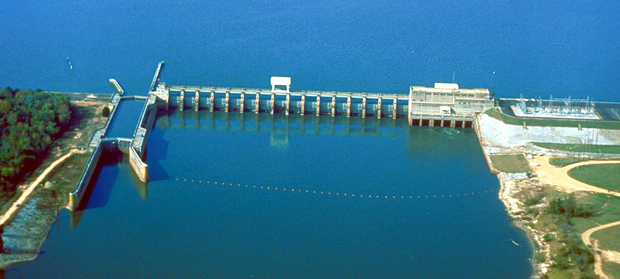
Aerial view of Jim Woodruff Lock and Dam, impounding Lake Seminole on the Chattahoochee and Flint Rivers. The dam spans the Florida–Georgia border. By U.S. Army Corps of Engineers, Public domain, via Wikimedia Commons
In much of the world, conflicts over transboundary waters are international in nature (see EarthDesk July 17, July 13, and June 17). Here in the US, we have a long history of conflicts over waters that transcend state boundaries. Best known are those fought over Western waters. But the East is no stranger to water wars. New lines have been drawn in the battleground states of Florida and Georgia where use of the shared waters of the Apalachicola River Basin are freshly in dispute.
Florida Governor Rick Scott announced yesterday that the state would file suit to increase the flow of water into Florida from upriver Georgia in an attempt to save the state’s failing oyster industry. Joining him was Senator Marco Rubio. Apalachicola oysters are famous internationally as a prized shellfish.
In his excellent story on the controversy, Karl Etters of the Tallahassee Democrat wrote today:
Over the past two years, the Apalachicola’s flow has diminished to an all-time low, partially due to extreme drought conditions in the southeast; as Atlanta’s population continues to grow its water consumption is expected to double to 705 million gallons a day by 2035.
Below are the dueling official statements of Florida Governor Rick Scott and Georgia Governor Nathan Deal.
 Florida: Governor Rick Scott was joined by U.S. Senator Marco Rubio to announce that the State of Florida will file a lawsuit in the U.S. Supreme Court to stop Georgia’s unchecked and growing consumption of water, which is threatening the economic future of Apalachicola. Governor Rick Scott said, “Because Georgia has not negotiated in good faith to fairly share the waters that flow between our two states, we are announcing today that Florida will bring suit in the U.S. Supreme Court next month to stop Georgia’s unchecked consumption of water that threatens the existence of Apalachicola fisheries and the economic development of this region.”This lawsuit will be targeted toward one thing – fighting for the future of Apalachicola. This is a bold, historic legal action for our state. But this is our only way forward after 20 years of failed negotiations with Georgia.”Florida and Alabama have each sought relief from harms caused by reduced flows and increased Georgia consumption in the Apalachicola-Chattahoochee-Flint (ACF) River Basins over the past 20 years through legal challenges to the Army Corps of Engineers’ water management practices without success. Florida: Governor Rick Scott was joined by U.S. Senator Marco Rubio to announce that the State of Florida will file a lawsuit in the U.S. Supreme Court to stop Georgia’s unchecked and growing consumption of water, which is threatening the economic future of Apalachicola. Governor Rick Scott said, “Because Georgia has not negotiated in good faith to fairly share the waters that flow between our two states, we are announcing today that Florida will bring suit in the U.S. Supreme Court next month to stop Georgia’s unchecked consumption of water that threatens the existence of Apalachicola fisheries and the economic development of this region.”This lawsuit will be targeted toward one thing – fighting for the future of Apalachicola. This is a bold, historic legal action for our state. But this is our only way forward after 20 years of failed negotiations with Georgia.”Florida and Alabama have each sought relief from harms caused by reduced flows and increased Georgia consumption in the Apalachicola-Chattahoochee-Flint (ACF) River Basins over the past 20 years through legal challenges to the Army Corps of Engineers’ water management practices without success.More here. |
 Georgia: After Florida Gov. Rick Scott said today that his state will sue Georgia in the U.S. Supreme Court over water use, Gov. Nathan Deal called the move a frivolous waste of time and money when Georgia has waited more than a year for Florida to respond to its latest settlement proposal. Georgia: After Florida Gov. Rick Scott said today that his state will sue Georgia in the U.S. Supreme Court over water use, Gov. Nathan Deal called the move a frivolous waste of time and money when Georgia has waited more than a year for Florida to respond to its latest settlement proposal.“Gov. Scott’s threat to sue my state in the U.S. Supreme Court greatly disappoints me after I negotiated in good faith for two years,” Deal said. “More than a year ago, I offered a framework for a comprehensive agreement. Florida never responded. It’s absurd to waste taxpayers’ money and prolong this process with a court battle””. . . Georgia has made significant progress on water conservation and has proposed an agreement that would meet the needs of both states. While the timing seems to work for political purposes, it’s ironic this comes at a time when Florida and Georgia are experiencing historically high rainfall.The fastest and best resolution is an agreement, not a lawsuit going into an election year. On the flip side, the merits of Georgia’s arguments have consistently prevailed in federal court, and a victory in the U.S. Supreme Court would decide this issue in Georgia’s favor.” More here. |









